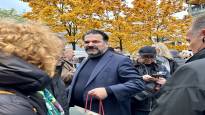BERLIN Bread, wine and candles are laid on the long festive table. There are 220 empty chairs around, each of which has been taped with the picture and name of the person taken hostage by Hamas. There are baby bottles for babies.
And as always in Jewish events in Europe, the street corner was guarded by a group of heavily armed policemen. Concrete barriers and steel fences prevent cars from driving onto the street.
The Jewish community, Jüdische Gemeinde zu Berlin, is organizing a demonstration of solidarity with those kidnapped in Israel in the center of the city on the Sabbath. The Sabbath is the most important Jewish holiday. It is celebrated from Friday evening to Saturday evening.
These days it is more dangerous living as a Jew in Germany like never before since World War II.
– Not only in Berlin but worldwide, Jews feel threatened and unsafe, chairman of the Berlin Jewish community Gideon Joffe says.
Since the Hamas attack, an average of 22 anti-Semitic acts have been reported per day, according to Rias, Germany’s federal research center for anti-Semitism. That’s two and a half times more than last October.
Arson attempts, violent riots, painting of the Star of David on the doors of Jewish families. Several bomb threats that there may be a connection To Hamas.
On Tuesday, the police arrested a man suspected of planning to drive a truck to a Jewish event in Essen.
– Jewish life is like Russian roulette: everyone knows that soon something bad will happen somewhere. But you can’t tell if it will happen in America, Europe, Berlin or where, says Joffe.
Hitler’s Nazi Germany killed six million Jews, and modern Germany wants to ensure the safety of the Jews by all means. According to Joffe, the authorities have clearly increased police surveillance of Jews.
– The authorities are very supportive and do everything they can to make us feel safe, and we are very grateful for that.
People don’t dare to wear religious signs while walking in the streets.
Israeli Haggai Isaac has lived in Germany for 11 years. He wears a kippah at a solidarity event, but only because there are so many policemen there. Otherwise, he wouldn’t dare to use it.
Like other Jews, he knows how to be careful when moving outside. The most important thing is to monitor the environment carefully, he says.
– Some friends do not dare to tell their workplace that they are Jewish. Some people don’t want to order a taxi or food delivery, Isaak says. Many Berlin taxi drivers or food delivery people come from an Islamic country.
Public, pro-Palestinian gatherings have been banned in various German states and cities in recent weeks. Despite that, there are expressions of opinion popular. Some of the participants are suspected of a crime.
– People encourage the intifada and shout “water to water”. How is that possible, how are they allowed to do that, Isaak asks.
Intifada means a violent popular uprising usually against Israel. The slogan “from water to water” or “from river to sea” is also used by terrorist organizations such as Hamas. It is perceived as a threat to wipe all of Israel and the Jews off the map.
Chilean Daniela Rusowsky studies in Berlin to become a rabbi. He says that life for Jews in Chile is more difficult than in Germany, because the country has the largest Palestinian minority in the world. The German authorities protect the safety of the Jews better than the Chileans.
Rusowsky is not afraid on the streets of Berlin for himself, but for his children. According to him, the youth is “clearly” more anti-Jewish than the older generations. His own children are 14 and 17 years old.
In Berlin, for example, young people have torn down pictures hung by Jews of those kidnapped in Israel.
– Anti-Semitism is palpable in schools and universities. It wasn’t like this before, says Rusowsky.
All Jews are blamed for Israel’s actions.
– That’s what the new hatred of Jews means. Anti-Semitism has existed for thousands of years, and now it’s new again, says Rusowsky.
For a martini the young man introducing himself does not want to give his full name. He lives in a district of Neukölln that has been the center of violent anti-Israel riots.
– When I go out, I look at the street more closely than before and under no circumstances wear anything that identifies me as a Jew, Martin says.
If the situation gets worse, he will consider moving from Neukölln to another part of Berlin.
Middle aged Suzanne says that he is used to the constant threat against the Jews, and he is not afraid.
– It’s always a strange feeling going to the synagogue when there are so many policemen. Not only the building but also us are being closely watched now, says Suzanne.
After the Hamas attack, a Star of David has been painted on Susanne’s family door, she receives anti-Semitic WhatsApp messages, and some of her acquaintances have blocked her on social media.
According to Susanne, people who hate Jews have become more confident in recent weeks.
– They get support in their groups. They have also noticed that they are not alone, Susanne laughs ironically.
The liberal, anti-extremist Ibn Rushd-Goethe mosque in Berlin also had to close its doors this week. Its leader Seyran Ates told the staff that they were tired of constant threats and terror.
Ates itself has lived with strong security measures for years. Ibn Rushd-Goethe will be stuck at least until the end of next year.
Anti-Semitism strengthened in Germany even before the attack by Hamas and the Israeli counterattack. See what the Jewish rapper had to say three years ago in the video below.
